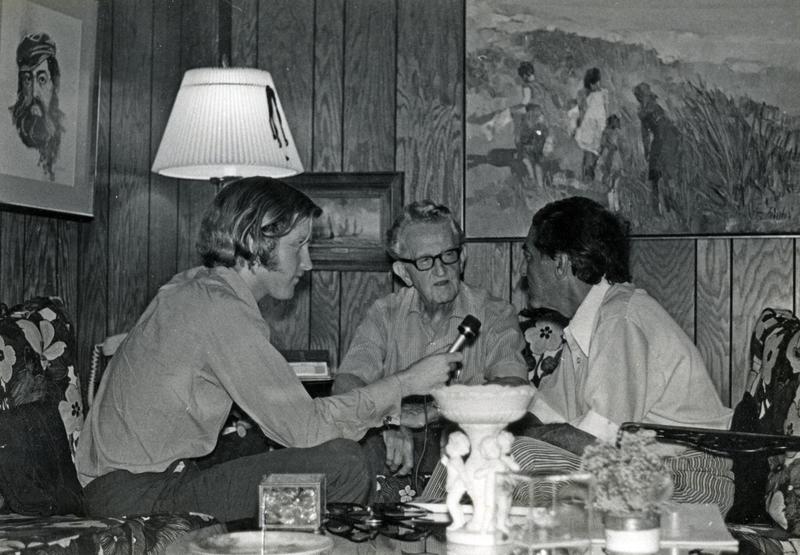
Douglas Cooper had run into Robert Merrill, baritone of the Metropolitan Opera, and arranged an interview at Merrill's home in New Rochelle, N.Y. There, Cooper and George O'Brien followed Merrill to a quiet, but ample space full of art.
Merrill began by answering O'Brien's question about his boyhood as a semi-pro pitcher. He played in Brooklyn and got $10 a night. But his mother was a strong, domineering woman who set up piano lessons for him, and made sure he vocalized,
practicing his boy soprano voice.
Merrill compares the likes of Dizzy Dean to pitchers of our day, and considered the great number of today's teams ultimately fielded better players. Cooper had read that last weekend Merrill had play golf with former Mayor Bob Wagner. It was a fun tale, and the singer won $4.
The performer was such a shy kid, when guests came over and he was made to sing, he did so from the bathroom, so he couldn't be seen. Needless to say, there were conflicts between playing ball and studying or vocalizing, and he developed a stutter.
Merrill began by answering O'Brien's question about his boyhood as a semi-pro pitcher. He played in Brooklyn and got $10 a night. But his mother was a strong, domineering woman who set up piano lessons for him, and made sure he vocalized,
practicing his boy soprano voice.
Merrill compares the likes of Dizzy Dean to pitchers of our day, and considered the great number of today's teams ultimately fielded better players. Cooper had read that last weekend Merrill had play golf with former Mayor Bob Wagner. It was a fun tale, and the singer won $4.
The performer was such a shy kid, when guests came over and he was made to sing, he did so from the bathroom, so he couldn't be seen. Needless to say, there were conflicts between playing ball and studying or vocalizing, and he developed a stutter.
Later on, Merrill said that to sing well, he had to stay in good condition and he discovered that a lot of the audience knew all the arias and came to the opera with express expectations. He tells the story of having a lot of self-absorbed Europeans on stage with him. One evening he'd eaten too much garlic with his meal, and as he neared the soprano and sang, she slapped him.
These days, he's cut his consumption in half. Just a salad with meal. No alcohol except for an occasional beer. He keeps his speaking voice light so as to avoid pressing on the vocal cords. The singer tells Cooper he feels just like he and George do in the morning. But he gets up at 8 AM, so he's got six hours even if there's a 2 PM matinee. Before evening performances, sometimes he's tired and has a cold, but with concentration and desire, he gets himself enthralled, and can wind up feeling like a bull.
O'Brien asked about his being the first opera star to do TV talk shows. "Yes, Paar asked me, and I had a wonderful time. The next day people who knew nothing about the opera approached me as though they knew me."
Merrill talks too about the broad range of experience he has had throughout his life. This includes burlesque shows in Philadelphia during the Depression, Grossinger’s resort in the Catskills, his opportunities with Broadway and pop music and even being a straight man for The Three Stooges.
These days, he's cut his consumption in half. Just a salad with meal. No alcohol except for an occasional beer. He keeps his speaking voice light so as to avoid pressing on the vocal cords. The singer tells Cooper he feels just like he and George do in the morning. But he gets up at 8 AM, so he's got six hours even if there's a 2 PM matinee. Before evening performances, sometimes he's tired and has a cold, but with concentration and desire, he gets himself enthralled, and can wind up feeling like a bull.
O'Brien asked about his being the first opera star to do TV talk shows. "Yes, Paar asked me, and I had a wonderful time. The next day people who knew nothing about the opera approached me as though they knew me."
Merrill talks too about the broad range of experience he has had throughout his life. This includes burlesque shows in Philadelphia during the Depression, Grossinger’s resort in the Catskills, his opportunities with Broadway and pop music and even being a straight man for The Three Stooges.
"In the long run, you forget how many people you're performing for...1500, 2000, 3000...or 67,000 at Yankee Stadium doing the Star Spangled Banner. Or 37 million on international TV. You can get preoccupied; so at the ball games I hide the words on a score card," the singer reflects.
Cooper asks if there's a resurgence of young composers. Merrill says that in Europe it's true, because they're subsidized. In the U.S., a talented composer can spend two years on an opera and never get it performed. Canada is like Europe in that respect. As a member of the National Arts Council, he hopes they can raise $100 million in that effort.
He talks about life and the arts, nature, gorgeous paintings. Ultimately it's not about a three-car garage. He recalls that in 1949 he was in Munich to perform. It was 80% destroyed from the war. Yet the first rebuilding was the opera house; it was more important to them than other necessities.
As to expanding the interest in opera, he says, "We're trying. You don't have to know Italian. Just relax and enjoy it. Just like not having to be a painter to enjoy Rembrandt or Picasso."
_______________________________________________________________________________________________________________
The Douglas P. Cooper Distinguished Contemporaries Collection (1967-1974) contains rare interviews with influential writers, statesmen, artists, songwriters, journalists and others who have left their mark on our culture.
The Origins of The Cooper Collection
